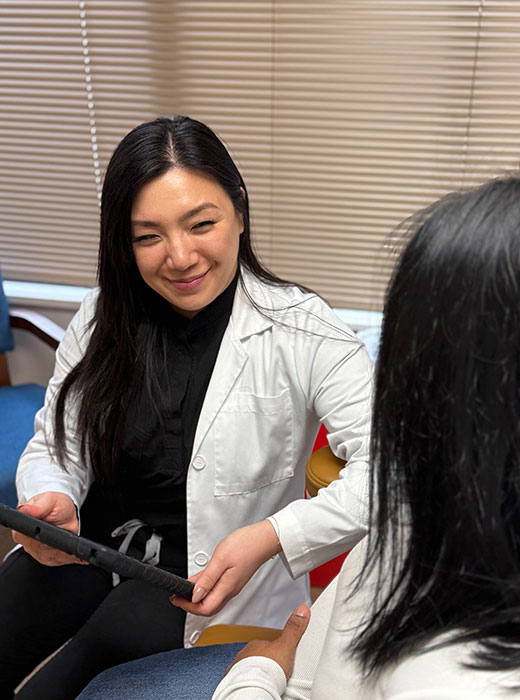
Women's HRT Therapy
Our goal is to offer a holistic treatment plan for peri-/menopausal women to thrive with medically supervised hormone therapy. As part of your monthly membership, stay supported with lab monitoring, specialist visits, virtual care, plus 25% off THORNE supplements and exclusive discounts on Red Light Therapy.
Signs and Symptoms of Hormone Deficiency
Estrogen Deficiency
- Hot flashes and night sweats
- Vaginal dryness and discomfort
- Mood changes
- Bone Loss (Osteoporosis and fractures)
- Changes in skin (reduced elasticity, dryness, and wrinkles)
- sleep disturbances
- Reduced libido
Progesterone Deficiency
- Irregular menstrual periods
- Mood Changes
- Breast tenderness
- Sleep disturbances
- Water retention
Testosterone Deficiency
- Decreased libido
- Fatigue and Reduced Energy
- Decreased muscle mass
- Mood changes
- Bone density loss
- Cognitive changes
Transform into Your Best Self in 3 Easy Steps!
Step 1:
Schedule Your Women's Hormone Therapy Consultation
During your phone visit, our specialist will assess your medical history and goals. They’ll then order a comprehensive lab panel to check for metabolic or hormonal imbalances.
Step 2:
Complete your lab work
We partner with Quest Diagnostics to ensure your labs are processed accurately and efficiently. The cost of your lab work is included in your consultation fee, so there are no additional charges for this service.
Step 3:
Follow Up for Your Customized Plan:
One week after your labs, schedule a complimentary video visit. Your provider will review your results and create a personalized prescription plan tailored to your goals.
Program Enhancement
Low-dose testosterone therapy
Optimizing Growth Hormone with Peptide Assistance
Suboptimal growth hormone can lead to symptoms like fatigue, changes in body composition, impaired bone health, reduced exercise tolerance, metabolic issues, skin and hair changes, cognitive impairment, mood fluctuations, sleep disturbances, and decreased libido. Our integrated program offers optimization of growth hormone with the assistance of peptides.
Combined HRT + Peptide Program
This premium membership extends the HRT program benefits. Ideal for those seeking innovative peptide medicine for enhanced health—details under the “Peptide Therapy Program” tab.
Frequently Asked Questions
Please reach us at [email protected] if you cannot find an answer to your question.
HRT involves supplementing or replacing female hormones, like estrogen and progesterone, to alleviate symptoms associated with menopause or hormonal imbalance.
Women often turn to HRT to manage symptoms of menopause, such as hot flashes, mood swings, and sleep disturbances. It can also address hormonal imbalances impacting overall well-being.
HRT can be estrogen-only or a combination of estrogen and progesterone. The delivery methods include pills, creams, and injections.
The timing of HRT initiation varies for each woman. It is often recommended for women going through peri-/menopause to manage symptoms. The decision to start HRT should be made in consultation with a healthcare provider based on individual health and risk factors.
Perimenopause is the transitional phase before menopause, typically starting in a woman’s 40s. It involves hormonal changes leading to symptoms like irregular menstrual cycles and hot flashes. Menopause marks the end of reproductive years, defined as 12 consecutive months without a period, usually occurring around age 51.
Absolute contraindications include history of breast cancer, endometrial cancer, blood clots or stroke, active liver disease, active cardiovascular disease, and women over age 65. Each woman’s risk factors, medical history, and symptoms will be carefully evaluated by your healthcare provider to determine the most appropriate course of action during the consultation.
Side effects can vary depending on the type of HRT and individual response. Common side effects include breast tenderness, bloating, and mood changes.
While HRT can be effective, it’s not without risks. Potential risks include an increased risk of blood clots, stroke, and breast cancer. It’s crucial to discuss individual health factors with your healthcare provider during your consultation.
The duration of HRT varies based on individual needs. Some women may use it for a short-term relief of menopausal symptoms, while others may continue for a more extended period. Regular evaluations with a healthcare provider are essential.
Blood tests every 3 months are conducted to assess hormone levels, ensuring they stay within the optimal range. Adjustments to the treatment plan may be made based on these results.
Individual responses vary, but improvements in symptoms may be noticed within a few weeks to a few months.
Depending on individual health needs, TOT may be combined with other therapies (e.g. peptide therapy, NAD+, etc.), low-dose testosterone therapy, or lifestyle changes to optimize overall well-being.

Wellness Membership client portal
Access the Client Portal
New and returning patients for our Medical Weight Loss, Testosterone Optimization Therapy, Women’s Hormone Therapy, and Peptide Therapy can access their portal for secure messaging with their provider at https://genesiswa.clientsecure.me.
Client Portal Features
Send secure messages to your provider (Exclusive to Wellness Program Members).
Telehealth with a Simple Touch
Learn how to download the free app at The SimplePractice Client Portal mobile app – SimplePractice Support
Beginning of a better you.
Reviews
Trustindex verifies that the original source of the review is Google. Grace is amazing! She is very knowledgeable and answered every single question I had. She has a steady handy and the injections didn’t hurt at all. I highly recommend her to anyone!Trustindex verifies that the original source of the review is Google. I highly recommend this business. I was scheduled for my very first lip filler and was a bit nervous about it. Grace Lee was so very kind and sweet, she immediately put me at ease. She took the time to go over everything with me, and give her honest opinions. From the time I walked through the door, until I walked out, and everything in-between, was a positive five stars!!!! **Just had my two week follow up. Grace is just so sweet. She's knowledgeable in her trade, and fun to sit and talk to about everyday stuff! Go see her, she won't disappoint!Trustindex verifies that the original source of the review is Google. Grace really went out of her way to ensure I felt comfortable during my examination! Thank you soo much for your valuable time, and support!Trustindex verifies that the original source of the review is Google. Overall, very professional and knowledgeable service. Grace is wonderful and gave me the results I was seeking. I Highly recommend this place and will be back.Trustindex verifies that the original source of the review is Google. I had very good experience with doctor Grace. Very professional and clear. Thank youTrustindex verifies that the original source of the review is Google. Grace Lee provides exceptional care with a personalized approach tailored to individual needs. Her expertise ensures a comprehensive and effective treatment plan. Grace's compassionate demeanor and thorough understanding of her patients make her a trusted healthcare provider. I highly recommend Genesis Wellness & Aesthetics for anyone seeking health optimization.Trustindex verifies that the original source of the review is Google. Had my Dysport injections done by Grace and I Absolutely loved my experience!! She is so personable and amazing!! The outcome is better than I imagined and zero bruises!!Trustindex verifies that the original source of the review is Google. I always have such a wonderful experience with Master Esthetician Anastatia! She is so sweet and informative She always has me absolutely cackling, time just goes by. If you like feeling glowy and uplifted I highly recommend getting a facial with her!Trustindex verifies that the original source of the review is Google. Great experience! It was my first time getting filler and Grace made me feel so comfortable and explained everything to me, so kind and professional. Thank you.Trustindex verifies that the original source of the review is Google. Very friendly and excellent job


